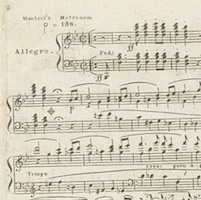Letter to Bill (after performing the Hammerklavier sonata at Festival Baltimore)
|
Beth Levin [July 2019.]
Dear Bill, The thing about this last concert was the pre-concert depression. I sunk really low and felt so incredibly sad. I don’t really know what that was about. I tend to get down beforehand but this felt suicidal. I was staying with friends in Baltimore and the night before the concert all of the mistakes of my life seemed to surround me and grip me. Everything felt wrong. So wrong! At home I would normally lie on the couch in invalid mode but I was with friends and had to come out of myself and act at least halfway normal. Haha – it all feels slightly ludicrous in retrospect. My friends (of the delicious crab cake recipe – I was told that crab cake on a Saltine was the way they grew up eating it) had a beautiful Steinway at their home and I got in some excellent practicing before the concert. Their piano was vintage and had a certain sweetness to the tone. The piano at the hall was “state of the art” – almost murmuring, “I dare you!” No sweetness there, but power and one certainly could make music on it. Just so new, shining black and devoid of quirks. In ten years it will be a gem. The hall was beautiful – I remember that much. I don’t remember much about the recital itself. I take that as a good sign – not being haunted by it, but having it flow, happen and come to an end. The people stood at the end – that was lovely for me. I made a mistake right at the beginning in a scale going up in the Handel – but after that I think I played with more mastery. The Hammerklavier felt like playing a great role like King Lear. The piece really demanded everything – deepest emotion, color, reaction, assertiveness, richness, tenderness, extreme contrast in mood, the limit of technique – just to describe some of what that work asks from the performer. I played the first movement on the slow side but I think it worked – you could really hear what Beethoven was doing – and the phrasing is so gorgeous that way. The final movement may be the biggest challenge, at least technically – it verges on being unplayable I think. I know the singers felt that about his Missa Solemnis – not singable. I took the Adagio faster, and I think that worked well too. The Adagio feel was still there, but you could hear the long line and things held together… like a good crab cake! A good title: “The Hammerklavier on a Saltine!” The piece grabs you and puts you through your paces as they say from the opening chords – which had always cowed me in practicing – you have to truly live that piece and portray it at the same time – which is why it feels like a dramatic role I think. I honestly felt in the last few pages that I was almost home and feeling a slight relief at that – and then at the true end of the concert the audience reaction overtook me for several minutes – I ran backstage and ripped off my rather fancy dress in such a hurry and got into plain clothes. I don’t know why I did that. It is a week later now and I still feel a bit “off.” All of the depression is gone, but is there such a thing as post-Hammerklavier stress syndrome? Kidding, but you don’t play that work and stay the same. It leaves you very tired and kind of nostalgic for the music and for everything in your life – lived and unlived. And it forces you to explore everything you’re made of at the piano – pure and simple. I’ve been practicing chamber music for a rehearsal next week – and my heart hasn’t been in it fully. I think the word “force” is so relevant to the Hammerklavier. The piece is a force of nature – like Beethoven – and it forces things from the performer – like a tough fight, one that you can’t exactly win, but can see end in a draw. –Beth * * * Warres Crab Cakes (Serves 4) 1 lb jumbo lump crabmeat, picked over (should be freshly picked crabmeat, NOT canned or “pasteurized”). 1 cup crushed saltines (24 saltine crackers) ½ cup mayonnaise (heaping ½ cup) 2 eggs 2 tbs Dijon mustard 1 tbs Worcestershire sauce Dash (generous) of Tabasco Sauce Vegetable oil for frying or deep frying, or clarified butter or olive oil for sautéing Salt and pepper Old Bay seasoning, to taste
[More Beth Levin]
[More
Beethoven]
[Previous Article:
Three Concerts]
[Next Article:
Collecting Is Forgetting]
|
